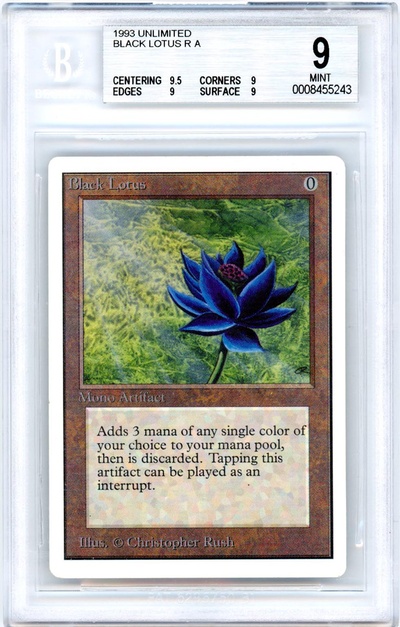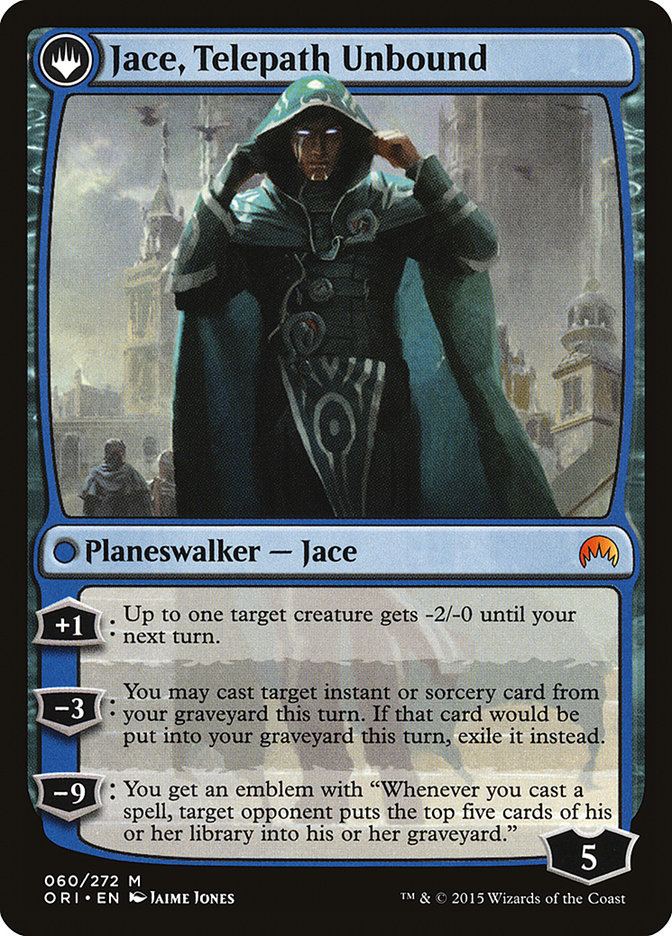I wonder if I’d ever type those words before: “I care about Jace.”
Well, I have, and I do.
Oh, sure, my resistance has been eroding for years. From the great “meh” I gave Jace Beleren on his Lorwyn debut – mysterious young mind-mage, wow, never seen that one before – I’ve had my mental defenses pried open by Ari Marmell’s Agents of Artifice (just a crack), Uncharted Realms’s short story “Project Lightning Bug” (a little more), and the Magic Origins short story “Jace’s Origin: Absent Minds” (a whole lot, as I explained a few weeks back).
Then I read the Uncharted Realms story “Catching Up” last week, and I came around. There are still some things that annoy me about Jace, but I care about him now.
And all it took was a tale as cheesy as a fondue pot.
Catching Up With “Catching Up”
None of the following will make any sense without having read the Uncharted Realms short story “Catching Up.” Here’s the link again. Have a spoiler buffer.

Can cast Jace Beleren. Or, I don’t know, Show and Tell or something. Your pick.
While this story works on its own as a self-contained episode, it also has plenty of reader bonuses for Vorthoses of a certain vintage. As a fiction fiend I’m forever digging into what makes a story tick, and “Catching Up” provides interesting material.
Take that first paragraph of two sentences. What can someone with no knowledge whatsoever of Magic unpack from them?
1) “The Golgari” represent some sort of faction. They have a delegation, so there’s some sort of sophistication to their diplomacy.
2) Their ambassadors smell like fungal rot and their attendants are zombies, so there’s something off-kilter about them.
3) Jace, the viewpoint character, is glad to see them go.
4) Jace also is a spellcaster of some sort, capable of banishing the Golgari scent.
That’s a lot of information to pack into two sentences – not sprawling, Proustian sentences either.
Now add the information from the second paragraph, not much longer than the first.
5) Jace’s smile was fake (suggested by the word “tightly” in the first paragraph, confirmed by quickly dropping it after the Golgari are gone).
6) The setting is Jace’s office, where he’s just put in a large wooden desk…
7) …but he doesn’t have a chair yet. Interesting info with multiple possible meanings.
8) The chair he wants is luxurious rather than austere – but not merely luxurious; the author doesn’t use that term, but “expensive.”
Put all that together, and what could one surmise about this Jace?
Well, he’s a spellcaster, and he’s somebody important enough that the Golgari (whoever they are) delegation paid him a visit. On the other hand, he’s probably new to his role, whatever it is, since he doesn’t even have a chair yet. He also craves luxury; he’s not a total ascetic. These small details become telling for the character.
Notably, the person who knows nothing about Magic knows nothing about what Jace looks like, other than that he identifies as “he.” He could be short, tall, thin, fat, blond-haired, brown-faced, or none of the above. Of course, the reader soon gets a visual introduction to Jace, Telepath Unbound, a convenient bit of storytelling shorthand that most writers don’t get to use. I don’t hold it against the author, though. If you have a tool, use it!

Subsequent paragraphs introduce Lavinia as Jace’s bailiff – in other words, his muscle, but a specifically chosen term to give legal flavor. Now Jace seems less a diplomat or ambassador, as one might have assumed from the word “delegation” in the first paragraph, and more a judge or arbiter. She’s a tough woman (twelve hours in full ceremonial armor? Even with a magical assist, yikes!) and he’s the “Guildpact,” as she calls him. Now we have a name for Jace’s office and an understanding that the Golgari form a guild.
The professional relationship between Jace and Lavinia should come as little surprise to anyone who was around for Return to Ravnica block, especially readers of e-book The Secretist, but note how skillfully all the information is dropped in so that a complete newcomer still has plenty of understanding.
Next comes a particularly revealing line of Jace’s. He smarts off to his bailiff about coffee (a beverage with a long and distinguished Earth history). This point has the potential to jar new readers out of the story; coffee seems mundane to the sorts of people who’d be reading the story in 2015, too Earth-like and not fantasy enough. Dedicated Vorthoses know better; Ravnica is based on Central and Eastern Europe, which includes nations such as Austria that have a famous “coffeehouse culture.” Ravnica is thoroughly urbane and perhaps closest to Magic’s “mage-punk” ideal.
On the other hand, a newcomer wouldn’t know about “mage-punk” at all, and the only hint of the setting being called “Ravnica” is in the explanatory note at the top of the article.* The “Coffee” line, while funny, is the first point of major divergence for the reading experience of Vorthoses and the uninitiated.
* You may have noticed that I differentiate between the story and the article. The article includes the “explanatory” paragraph topside, which provides a catch-up function for people who already know about Magic lore. On the other hand, for someone new to the game, “Living Guildpact, the magically empowered arbiter of inter-guild conflicts on the city-plane of Ravnica” is utterly incomprehensible.
The Vorthos/non-Vorthos split gets even wider as Jace goes to his sanctum. The previous caution about dripping information into the story is gone; the first sanctum paragraph casually tosses in the word “plane” without supporting its meaning as “a different world,” though the second sanctum paragraph does suggest the “plane = world” equivalence with its mention of globes in the plural. There’s little indication, however, that the “Zendikar” hedron and the “Onakke” ogre horn don’t belong to the world of Ravnica.
So the story starts off easy for the Magic novice, though it ramps up in difficulty. Then Jace’s old flame shows up and the cheese – delicious, delicious cheese – kicks in.
I Knew You Were Trouble
In one paragraph (beginning “Jace hadn’t seen Liliana Vess…”) is a strong summary of the B-plot in Ari Marmell’s Agents of Artifice. Liliana and Jace had something special going on, but when it became advantageous to betray Jace, Liliana did. Maybe she felt bad then and feels bad now for losing that something special, but in the end, it’s all about what Liliana wants.
And what Liliana wants is back in Jace’s life.
“He knew better.”
And he engaged anyway. Which of us hasn’t made that mistake or one like it?
One of the big knocks on Jace in the Vorthos community is how vague everything is. Even allowing for Jace not to know his past, he was maddeningly vague as a present being with goals for the future. The small touches, like wanting the leather chair, how he didn’t like touching the runes etched on Liliana’s skin, and how he looked at Liliana’s nose because it was the only place he didn’t associate with a memory, make him rounder, make him human, make him whole.
Also, for the writer-dreamers out there: scent is a powerful and underused tool. Liliana’s combination of lilac and cinnamon over rot is visceral and telling.
There’s a certain pleasure in seeing Jace outside his usual “boring mind-mage” comfort zone. As his sanctum shows, he likes being closed off from others, the one who sees and is not seen. Reading his interactions with Liliana, one of the few people who can make him do things unconsciously (the hair scene), illuminates both him and her.
The back-and-forth drags on a bit, especially when the conversation turns to Garruk Wildspeaker (a bit too much catching up, perhaps), but it’s a narrative necessity to set up The Chain Veil for later. And it’s plain from what follows, when Jace asks why Liliana’s come to him, that even though he can read most minds, he’s ill-equipped to fight a war of words, especially against a talented manipulator like Liliana.
So she lands her date night with the Living Guildpact. After the amusing rose scene (and one of the most subtle throw-ins of a same-sex couple I’ve seen in any media: “‘Sir! A flower for your boyfriend there?'”) it’s suppertime, and though Jace picks the restaurant with no qualms about his food getting comped, Liliana shows her greed once again with her choice of wine.
And just when she’s about to get her hooks into Jace again with the puzzle of The Chain Veil, in barges Kytheon… I mean, Gideon Jura, who’s way too coherent for a man running on no sleep and life-fumes. He has his own puzzle to solve, one that already had Jace’s attention: the hedrons of Zendikar and their inscriptions.
And as soon as Jace showed interest in something other than Liliana’s favorite topic, she put on her routine of petulance, a last attempt to box out Gideon Jura. (I give Liliana too much credit to think it’s a mere tantrum.) The attempt doesn’t work, though, and Liliana storms off for good. One last contrast scene (Gideon wants to go now, Jace wants sleep) and curtain.
I don’t often break down an entire Uncharted Realms story like this, but “Catching Up” was striking enough to warrant the treatment. I enjoyed the new insight about Jace, and as I said, I care about him now. That, and the story, cheesy as it was, is easy for me to imagine as a quiet interlude in a Magic movie…

